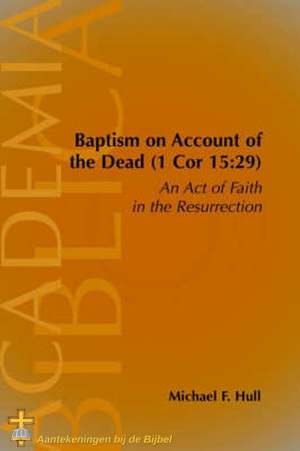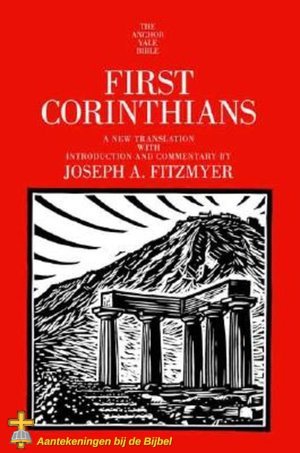
Aantekeningen bij de Bijbel
Vragen, overdenkingen en achtergronden over de Bijbel,
welke resulteren in allerlei aantekeningen.
| SV | En wij spreken wijsheid onder de volmaakten; doch een wijsheid, niet dezer wereld, noch der oversten dezer wereld, die te niet worden; |
| Steph | σοφιαν δε λαλουμεν εν τοις τελειοις σοφιαν δε ου του αιωνος τουτου ουδε των αρχοντων του αιωνος τουτου των καταργουμενων
|
| Trans. | sophian de laloumen en tois teleiois sophian de ou tou aiōnos toutou oude tōn archontōn tou aiōnos toutou tōn katargoumenōn |
Algemeen
Zie ook: Wijsheid
Job 28:21, 1 Corinthiers 15:24, Jakobus 3:15
Aantekeningen
En wij spreken wijsheid onder de volmaakten; doch een wijsheid, niet dezer wereld, noch der oversten dezer wereld, die te niet worden;
- Epistula Apostolorum § 28
- Oratio Pauli
- Clement Stromata 5 25 § 2; 5 65 § 5; 5 80 § 4 ; 6 68 § 1
- Irenaeus 1.8.4: They also assert that by Anna, who is spoken of in the gospel Luke 2:36 as aprophetess, and who, after living seven years with her husband, passed all the rest of her life inwidowhood until she saw the Saviour, and recognised Him, and spoke of Him to all, was most plainly indicated Achamoth, who, having for a little while looked upon the Saviour with His associates, and dwelling all the rest of the time in the intermediate place, waited for Him till He should come again, and restore her to her proper consort. Her name, too, was indicated by the Saviour, when He said, Yet wisdom is justified by her children. Luke 7:35 This, too, was done by Paul in these words, But we speak wisdom among them that are perfect. 1 Corinthians 2:6 They declare also that Paul has referred to the conjunctions within the Pleroma, showing them forth by means of one; for, when writing of the conjugal union in this life, he expressed himself thus: This is a great mystery, but I speak concerning Christ and the Church. Ephesians 5:32
- Irenaeus AH 3.2.1 - For [they allege] that the truth was not delivered by means of written documents, but vivâ voce: wherefore also Pauldeclared, But we speak wisdom among those that are perfect, but not the wisdom of this world.1 Corinthians 2:6 And this wisdom each one of them alleges to be the fiction of his own inventing, forsooth; so that, according to their idea, the truth properly resides at one time in Valentinus, at another in Marcion, at another in Cerinthus, then afterwards in Basilides, or has even beenindifferently in any other opponent, who could speak nothing pertaining to salvation. For every one of these men, being altogether of a perverse disposition, depraving the system of truth, is not ashamed to preach himself.
- Irenaeus 5.6.1 - Now God shall be glorified in His handiwork, fitting it so as to be conformable to, and modelled after, His own Son. For by the hands of the Father, that is, by the Son and the Holy Spirit, man, and not [merely] a part of man, was made in the likeness of God. Now the soul and the spirit are certainly apart of the man, but certainly not the man; for the perfect man consists in the commingling and the union of the soul receiving the spirit of the Father, and the admixture of that fleshly nature which was moulded after the image of God. For this reason does the apostle declare, We speak wisdom among them that are perfect, 1 Corinthians 2:6 terming those persons perfect who have received the Spirit of God, and who through the Spirit of God do speak in all languages, as he used Himself also to speak. In like manner we do also hear many brethren in the Church, who possess prophetic gifts, and who through the Spirit speak all kinds of languages, and bring to light for the general benefit the hidden things of men, and declare the mysteries of God, whom also the apostle terms spiritual, they beingspiritual because they partake of the Spirit, and not because their flesh has been stripped off and taken away, and because they have become purely spiritual. For if any one take away the substanceof flesh, that is, of the handiwork [of God], and understand that which is purely spiritual, such then would not be a spiritual man but would be the spirit of a man, or the Spirit of God. But when the spirithere blended with the soul is united to [God's] handiwork, the man is rendered spiritual and perfectbecause of the outpouring of the Spirit, and this is he who was made in the image and likeness of God. But if the Spirit be wanting to the soul, he who is such is indeed of an animal nature, and being left carnal, shall be an imperfect being, possessing indeed the image [of God] in his formation (in plasmate), but not receiving the similitude through the Spirit; and thus is this being imperfect. Thus also, if any one take away the image and set aside the handiwork, he cannot then understand this as being a man, but as either some part of a man, as I have already said, or as something else than aman. For that flesh which has been moulded is not a perfect man in itself, but the body of a man, and part of a man. Neither is the soul itself, considered apart by itself, the man; but it is the soul of aman, and part of a man. Neither is the spirit a man, for it is called the spirit, and not a man; but the commingling and union of all these constitutes the perfect man.
- Clement Stromata 5,4 - Expressly then respecting all our Scripture, as if spoken in a parable, it is written in the Psalms, Hear, O My people, My law: incline your ear to the words of My mouth. I will open My mouth in parables, I will utter My problems from the beginning. Similarly speaks the nobleapostle to the following effect: Howbeit we speak wisdom among those that are perfect; yet not the wisdom of this world, nor of the princes of this world, that come to nought. But we speak the wisdom of God hidden in a mystery; which none of the princes of this world knew. For had theyknown it, they would not have crucified the Lord of glory. The philosophers did not exert themselves in contemning the appearance of the Lord. It therefore follows that it is the opinion of the wise among the Jews which the apostle inveighs against. Wherefore he adds, But we preach, as it is written, what eye has not seen, and ear has not heard, and has not entered into the heart of man, what God has prepared for them that love Him. For God has revealed it to us by the Spirit. For the Spirit searches all things, even the deep things of God.1 Corinthians 2:9-10 For he recognises the spiritual man and the Gnostic as the disciple of the Holy Spiritdispensed by God, which is the mind of Christ. But the natural man receives not the things of theSpirit, for they are foolishness to him. 1 Corinthians 2:14 Now the apostle, in contradistinction tognostic perfection, calls the common faith the foundation, and sometimes milk, writing on this wise:Brethren, I could not speak to you as to spiritual, but as to carnal, to babes in Christ. I have fed you with milk, not with meat: for you were not able. Neither yet are you now able. For you are yet carnal: for whereas there is among you envy and strife, are you not carnal, and walk as men?1 Corinthians 3:1-3 Which things are the choice of those men who are sinners. But those who abstainfrom these things give their thoughts to divine things, and partake of gnostic food. According to thegrace, it is said, given to me as a wise master builder, I have laid the foundation. And another builds on it gold and silver, precious stones. 1 Corinthians 3:10-13 Such is the gnostic superstructure on the foundation of faith in Christ Jesus. But the stubble, and the wood, and the hay, are the additions of heresies. But the fire shall try every man's work, of what sort it is. In allusion to thegnostic edifice also in the Epistle to the Romans, he says, For I desire to see you, that I may impart unto you a spiritual gift, that you may be established. Romans 1:11 It was impossible that gifts of this sort could be written without disguise.
- Clement Stromata 5.10 - Rightly then, Plato, in the Epistles, treating of God, says: We must speak in enigmas; that should the tablet come by any mischance on its leaves either by sea or land, he who reads may remain ignorant. For the God of the universe, who is above all speech, all conception, all thought, can never be committed to writing, being inexpressible even by His own power. And this too Plato showed, by saying: Considering, then, these things, take care lest some time or other you repent on account of the present things, departing in a manner unworthy. The greatest safeguard is not to write, but learn; for it is utterly impossible that what is written will not vanish.Akin to this is what the holy Apostle Paul says, preserving the prophetic and truly ancient secret from which the teachings that were good were derived by the Greeks: Howbeit we speak wisdom among them who are perfect; but not the wisdom of this world, or of the princes of this world, that come to nought; but we speak the wisdom of God hidden in a mystery.1 Corinthians 2:6-7 Then proceeding, he thus inculcates the caution against the divulging of his words to the multitude in the following terms: And I, brethren, could not speak to you as tospiritual, but as to carnal, even to babes in Christ. I have fed you with milk, not with meat: for you were not yet able; neither are you now able. For you are yet carnal. 1 Corinthians 3:1-3 If, then, the milk is said by the apostle to belong to the babes, and meat to be the food of the full-grown, milk will be understood to be catechetical instruction— the first food, as it were, of the soul. And meat is the mystic contemplation; for this is the flesh and the blood of the Word, that is, the comprehension of the divine power and essence. Taste and see that the Lord is Christ, it is said. For so He imparts of Himself to those who partake of such food in a more spiritual manner; when now the soul nourishes itself, according to the truth-lovingPlato. For the knowledge of the divine essence is the meat and drink of the divine Word. Wherefore also Plato says, in the second book of the Republic, It is those that sacrifice not a sow, but some great and difficult sacrifice, who ought to inquire respecting God. And the apostle writes, Christ our passover was sacrificed for us; 1 Corinthians 5:7 — a sacrifice hard to procure, in truth, the Son of God consecrated for us.
- Clement of Alexandria stromata 5.12 - To these statements the apostle will testify: I know a man in Christ, caught up into the third heaven, and thence into Paradise, who heard unutterable words which it is not lawful for a man to speak,— intimating thus the impossibility of expressing God, and indicating that what is divine is unutterable by human power; if, indeed, he begins to speak above the thirdheaven, as it is lawful to initiate the elect souls in the mysteries there. For I know what is in Plato (for the examples from the barbarian philosophy, which are many, are suggested now by the composition which, in accordance with promises previously given, waits the suitable time). For doubting, in Timæus, whether we ought to regard several worlds as to be understood by many heavens, or this one, he makes no distinction in the names, calling the world and heaven by the same name. But the words of the statement are as follows: Whether, then, have we rightly spoken of one heaven, or of many and infinite? It were more correct to say one, if indeed it was created according to the model. Further, in the Epistle of the Romans to theCorinthians it is written, An ocean illimitable by men and the worlds after it. Consequently, therefore, the noble apostle exclaims, Oh the depth of the riches both of the wisdom and theknowledge of God! Romans 11:3 And was it not this which the prophet meant, when he ordered unleavened cakes to be made, intimating that the truly sacred mystic word, respecting the unbegotten and His powers, ought to be concealed? In confirmation of these things, in the Epistle to the Corinthians the apostle plainly says: Howbeit we speak wisdom among those who are perfect, but not the wisdom of this world, or of the princes of this world, that come to nought. But we speak the wisdom of God hidden in a mystery. 1 Corinthians 2:6-7 And again in another place he says:To the acknowledgment of the mystery of God in Christ, in whom are hid all the treasures of wisdom and knowledge. Colossians 2:2-3 These things the Saviour Himself seals when He says: To you it is given to know the mysteries of the kingdom of heaven. And again the Gospel says that the Saviour spoke to the apostles the word in a mystery. For prophecy says of Him: He will open His mouth in parables, and will utter things kept secret from the foundation of the world. And now, by the parable of the leaven, the Lord shows concealment; for He says, The kingdom of heaven is like leaven, which a woman took and hid in three measures of meal, till the whole was leavened. Matthew 13:33 For the tripartite soul is saved byobedience, through the spiritual power hidden in it by faith; or because the power of the word which is given to us, being strong and powerful, draws to itself secretly and invisibly every one who receives it, and keeps it within himself, and brings his whole system into unity. Accordingly Solon has written most wisely respecting God thus:— It is most difficult to apprehend the mind's invisible measure Which alone holds the boundaries of all things. For the divine, says the poet of Agrigenturn, — Is not capable of being approached with our eyes, Or grasped with our hands; but the highway Of persuasion, highest of all, leads to men's minds. And John the apostle says: No man has seen God at any time. The only-begotten God, who is in the bosom of the Father, He has declared Him, John 1:18 — calling invisibility andineffableness the bosom of God. Hence some have called it the Depth, as containing and embosoming all things, inaccessible and boundless.
- Origen Contra Celsus 3 - And when those who have been turned towards virtue have made progress, and have shown that they have been purified by the word, and have led as far as they can a better life, then and not before do we invite them to participation in our mysteries. "For we speak wisdom among them that are perfect."
- Tertullian Against Marcion 5.6 - By all these statements, therefore, does he show us what God he means, when he says, “We speak the wisdom of God among them that are perfect.” 5426 It is that God who has confounded the wisdom of the wise, who has brought to nought the understanding of the prudent, who has reduced to folly 5427 the world’s wisdom, by choosing its foolish things, and disposing them to the attainment of salvation. This wisdom, he says, once lay hidden in things that were foolish, weak, and lacking in honour; once also was latent under figures, allegories, and enigmatical types; but it was afterwards to be revealed in Christ, who was set “as a light to the Gentiles,” 5428 by the Creator who promised through the mouth of Isaiah that He would discover “the hidden treasures, which eye had not seen.” 5429 Now, that that god should have ever hidden anything who had never made a cover wherein to practise concealment, is in itself a wholly incredible idea. If he existed, concealment of himself was out of the question—to say nothing 5430 of any of his religious ordinances. 5431 The Creator, on the contrary, was as well known in Himself as His ordinances were. These, we know, were publicly instituted 5432 in Israel; but they lay overshadowed with latent meanings, in which the wisdom of God was concealed, 5433 to be brought to light by and by amongst “the perfect,” when the time should come, but “pre-ordained in the counsels of God before the ages.” 5434 But whose ages, if not the Creator’s? For because ages consist of times, and times are made up of days, and months, and years; since also days, and months, and years are measured by suns, and moons, and stars, which He ordained for this purpose (for “they shall be,” says He, “for signs of the months and the years”), 5435 it clearly follows that the ages belong to the Creator, and that nothing of what was fore-ordained before the ages can be said to be the property of any other being than Him who claims the ages also as His own. Else let Marcion show that the ages belong to his god. He must then also claim the world itself for p. 441 him; for it is in it that the ages are reckoned, the vessel as it were 5436 of the times, as well as the signs thereof, or their order. But he has no such demonstration to show us. I go back therefore to the point, and ask him this question: Why did (his god) fore-ordain our glory before the ages of the Creator? I could understand his having predetermined it before the ages, if he had revealed it at the commencement of time. 5437 But when he does this almost at the very expiration of all the ages 5438 of the Creator, his predestination before the ages, and not rather within the ages, was in vain, because he did not mean to make any revelation of his purpose until the ages had almost run out their course. For it is wholly inconsistent in him to be so forward in planning purposes, who is so backward in revealing them.In the Creator, however, the two courses were perfectly compatible—both the predestination before the ages and the revelation at the end thereof, because that which He both fore-ordained and revealed He also in the intermediate space of time announced by the pre-ministration of figures, and symbols, and allegories. But because (the apostle) subjoins, on the subject of our glory, that “none of the princes of this world knew it, for had they known it they would not have crucified the Lord of glory,” 5439 the heretic argues that the princes of this world crucified the Lord (that is, the Christ of the rival god) in order that this blow might even recoil 5440 on the Creator Himself. Any one, however, who has seen from what we have already said how our glory must be regarded as issuing from the Creator, will already have come to the conclusion that, inasmuch as the Creator settled it in His own secret purpose, it properly enough was unknown to all the princes 5441 and powers of the Creator, on the principle that servants are not permitted to know their masters’ plans, much less the fallen angels and the leader of transgression himself, the devil; for I should contend that these, on account of their fall, were greater strangers still to any knowledge of the Creator’s dispensations. But it is no longer open to me 5442 even to interpret the princes and powers of this world as the Creator’s, since the apostle imputes ignorance to them, whereas even the devil according to our Gospel recognised Jesus in the temptation, 5443 and, according to the record which is common to both (Marcionites and ourselves) the evil spirit knew that Jesus was the Holy One of God, and that Jesus was His name, and that He was come to destroy them. 5444 The parable also of the strong man armed, whom a stronger than he overcame and seized his goods, is admitted by Marcion to have reference to the Creator: 5445 therefore the Creator could not have been ignorant any longer of the God of glory, since He is overcome by him; 5446 nor could He have crucified him whom He was unable to cope with. The inevitable inference, therefore, as it seems to me, is that we must believe that the princes and powers of the Creator did knowingly crucify the God of glory in His Christ, with that desperation and excessive malice with which the most abandoned slaves do not even hesitate to slay their masters. For it is written in my Gospel 5447 that “Satan entered into Judas.” 5448 According to Marcion, however, the apostle in the passage under consideration 5449 does not allow the imputation of ignorance, with respect to the Lord of glory, to the powers of the Creator; because, indeed, he will have it that these are not meant by “the princes of this world.” But (the apostle) evidently 5450 did not speak of spiritual princes; so that he meant secular ones, those of the princely people, (chief in the divine dispensation, although) not, of course, amongst the nations of the world, and their rulers, and king Herod, and even Pilate, and, as represented by him, 5451 that power of Rome which was the greatest in the world, and then presided over by him. Thus the arguments of the other side are pulled down, and our own proofs are thereby built up. But you still maintain that our glory comes from your god, with whom it also lay in secret. Then why does your god employ the self-same Scripture 5452 which the apostle also relies on? What has your god to do at all with the sayings of the prophets? “Who hath discovered the mind of the Lord, or who hath been His counsellor?” 5453 So says Isaiah. What has he also to do with illustrations from our God? For when (the apostle) calls himself “a wise master-builder,” 5454 we find that the Creator by Isaiah designates the teacher who sketches 5455 out the divine discipline by the same title, “I will take away from Judah the cunning artifip. 442 cer,” 5456 etc.
Vertaalnotities
 Zie hier voor een verklaring van de gebruikte coderingen.
Zie hier voor een verklaring van de gebruikte coderingen.
Zie hier over het gebruik van de interlineair.
καταργουμενων
die te niet worden
|
En wij spreken wijsheid onder de volmaakten; doch een wijsheid, niet dezer wereld, noch der oversten dezer wereld, die te niet worden;
- τέλειος G5046 "volmaakt"; Komt niet in alle manuscripten voor. In de buitenbijbelse literatuur werd het toegepast als technische term voor een ingewijde van een mysteriegodsdienst (BDAG 995 s.v. τέλειος 3). Het zou hier kunnen verwijzen naar hen die Paulus' boodschap, het mysterie van God (vs. 1), geloofden, en dus vertaald kunnen worden als "zij die Gods boodschap geloven".
____
- "volmaakten" komt niet voor in alle handschriften (derhalve ook niet in de NBG51, NBV en WV96)
Koop nu
Commentaar
 Zie de huisregels welk commentaar wordt opgenomen!
Zie de huisregels welk commentaar wordt opgenomen!

![]() Zie hier voor een verklaring van de gebruikte coderingen.
Zie hier voor een verklaring van de gebruikte coderingen.




![]() Zie de huisregels welk commentaar wordt opgenomen!
Zie de huisregels welk commentaar wordt opgenomen!